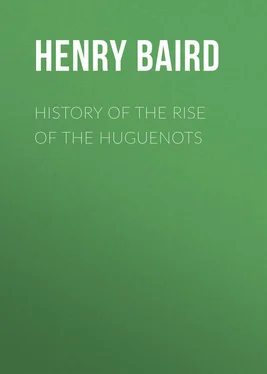Henry Baird - History of the Rise of the Huguenots
Здесь есть возможность читать онлайн «Henry Baird - History of the Rise of the Huguenots» — ознакомительный отрывок электронной книги совершенно бесплатно, а после прочтения отрывка купить полную версию. В некоторых случаях можно слушать аудио, скачать через торрент в формате fb2 и присутствует краткое содержание. ISBN: , Жанр: foreign_antique, foreign_prose, на английском языке. Описание произведения, (предисловие) а так же отзывы посетителей доступны на портале библиотеки ЛибКат.
- Название:History of the Rise of the Huguenots
- Автор:
- Жанр:
- Год:неизвестен
- ISBN:http://www.gutenberg.org/ebooks/30708
- Рейтинг книги:4 / 5. Голосов: 1
-
Избранное:Добавить в избранное
- Отзывы:
-
Ваша оценка:
- 80
- 1
- 2
- 3
- 4
- 5
History of the Rise of the Huguenots: краткое содержание, описание и аннотация
Предлагаем к чтению аннотацию, описание, краткое содержание или предисловие (зависит от того, что написал сам автор книги «History of the Rise of the Huguenots»). Если вы не нашли необходимую информацию о книге — напишите в комментариях, мы постараемся отыскать её.
History of the Rise of the Huguenots — читать онлайн ознакомительный отрывок
Ниже представлен текст книги, разбитый по страницам. Система сохранения места последней прочитанной страницы, позволяет с удобством читать онлайн бесплатно книгу «History of the Rise of the Huguenots», без необходимости каждый раз заново искать на чём Вы остановились. Поставьте закладку, и сможете в любой момент перейти на страницу, на которой закончили чтение.
Интервал:
Закладка:
425
Yet so much were intelligent observers deceived respecting the signs of the times, that only a little over two months before the actual outbreak of the second civil war (July 4, 1567), Judge Truchon congratulated France on the edifying spectacle of loving accord which the court furnished. "I have this very day," he writes, "seen the king holding, with his left hand, the head of my lord, the prince [of Condé], and with his right the head of my lord the Cardinal of Bourbon, and playfully trying to strike their foreheads together . The Duke d'Aumale was paying his attentions to Madame la Mareschale [de Montmorency.] … The Cardinal of Châtillon was not far off. In short, all, without distinction, seemed to me to be so harmonious that I wish there may never be greater divisions in France. It was a fine example for many persons of lower rank," etc. Letter to M. de Gordes, MS. in Archives de Condé, Duc d'Aumale, Princes de Condé, i. 540, Pièces inédites.
426
Jean de Serres, iii. 128, 129. See, also, Condé's letter of Aug. 23, 1568. Ibid., iii. 201.
427
Norris to Queen Elizabeth, Aug. 29, 1567, State Paper Office, Duc d'Aumale, Pièces inédites, i. 559.
428
"Sed ne frustra laborare viderentur, de Albani consilio, 'Satius esse unicum salmonis caput, quam mille ranarum capita habere,' ineunt rationes de intercipiendis optimatum iis, qui Religionem sequerentur, Condæo, Amiralio, Andelotio, Rupefocaldio aliisque primoribus viris. Ratio videbatur præsentissima, ut a rege accerserentur, tanquam consulendi de iis rebus quæ ad regnum constituendum facerent," etc. Jean de Serres, iii. 125. It will be remembered that this volume was published the year before the St. Bartholomew's massacre. The persons enumerated, with the exception of those that died before 1572, were the victims of the massacre.
429
"Ita Edicti nomen usurpabatur, dum Edictum revera pessundaretur." Jean de Serres, iii. 60.
430
The most authentic account of these important interviews is that given by François de la Noue in his Mémoires, chap. xi. It clearly shows how much Davila mistakes in asserting that "the prince, the admiral, and Andelot persuaded them, without further delay, to take arms." (Eng. trans., London, 1678, bk. iv., p. 110.) Davila's careless remark has led many others into the error of making Coligny the advocate, instead of the opposer, of a resort to arms. See also De Thou, iv. (liv. xlii.) 2-7, who bases his narrative on that of De la Noue, as does likewise Agrippa d'Aubigné, l. iv., c. vii. (i. 209), who uses the expression: "L'Amiral voulant endurer toutes extremitez et se confier en l'innocence."
431
"Ains avec le fer."
432
"Une armée gaillarde." La Noue, ubi supra .
433
Mém. de Castelnau, liv. vi., c. iv., c. v.; La Noue, c. xi.; De Thou, iv. (liv. xlii.) 5, 6. Davila, l. iv., p. 110, alludes to the accusation, extorted from Protestant prisoners on the rack, that "the chief scope of this enterprise was to murder the king and queen, with all her other children, that the crown might come to the Prince of Condé," but admits that it was not generally credited. The curate of Saint Barthélemi is less charitable; describing the rising of the Protestants, he says: "En ung vendredy 27e se partirent de toutes les villes de France les huguenots, sans qu'on leur eust dit mot, mais ils craignoient que si on venoit au dessein de leur entreprise qui estoit de prendre ou tuer le roy Charles neuvième, qu'on ne les saccagea ès villes." Journal d'un curé ligueur (J. de la Fosse), 85.
434
La Noue, and De Thou, ubi supra .
435
The historian, Michel de Castelnau, sieur de Mauvissière, had been sent as a special envoy to congratulate the Duke of Alva on his safe arrival, and the Duchess of Parma on her relief. As he was returning from Brussels, he received, from some Frenchmen who joined him, a very circumstantial account of the contemplated rising of the Huguenots, and, although he regarded the story as an idle rumor, he thought it his duty to communicate it to the king and queen. Mémoires, liv. vi., c. iv.
436
Mém. de Castelnau, ubi supra . It is probable that the French court partook of Cardinal Granvelle's conviction, expressed two years before, that the Huguenots would find it difficult to raise money or procure foreign troops for another war, not having paid for those they had employed in the last war, nor holding the strongholds they then held. Letter of May 7, 1565, Papiers d'état, ix. 172.
437
Mém. du duc de Bouillon (Ancienne Collection), xlvii. 421.
438
La Fosse, p. 86, represents Charles as exclaiming, when he entered the Porte Saint Denis: "Qu'il estoit tenu à Dieu, et qu'il y avoit quinze heures qu'il estoit à cheval, et avoit eust trois alarmes."
439
Mém. de Castelnau, liv. vi., c. v.; La Noue, c. xiii. (Anc. Coll., xlvii. 180-185); De Thou, iv. 8; J. de Serres, iii. 129-131; La Fosse, 86; Agrippa d'Aubigné, Hist. univ., i. 210.
440
"Ravi d'avoir allumé le feu de la gùerre," says De Thou, iv. 9.
441
De Thou, ubi supra .
442
The circumstance of two messengers, each bearing letters from the same person, while the letters made no allusion to each other, following one another closely, struck Alva as so suspicious, that he actually placed the second messenger under arrest, and only liberated him on hearing from his own agent on his return that the man's credentials were genuine.
443
Alva proposed to detach 5,000 men to prevent the entrance of German auxiliaries into France, and protect the Netherlands.
444
Letter of Alva to Philip, Nov. 1, 1567, Gachard, Correspondance de Philippe II., i., 593.
445
"Que la ley sálica, que dizien, es baya, y las armas la allanarian." Ibid, i. 594.
446
The price of wheat, Jehan de la Fosse tells us (p. 86) advanced to fifteen francs per "septier."
447
Journal d'un curé ligueur (J. de la Fosse), 86.
448
In one of Charles's first despatches to the Lieutenant-Governor of Dauphiny, wherein he bids him restrain, and, if necessary, attack any Huguenots of the province who might undertake to come to Condé's assistance, there occurs an expression that smacks of the murderous spirit of St. Bartholomew's Day: "You shall cut them to pieces," he writes, "without sparing a single person; for the more dead bodies there are, the less enemies remain (car tant plus de mortz, moins d'ennemys!)" Charles to Gordes, Oct. 8, 1567, MS. in Condé Archives, D'Aumale, i. 563.
449
Davila (i. 113) makes the latter her distinct object in the negotiations: "The queen, to protract the time till supplies of men and other necessary provisions arrived, and to abate the fervor of the enemy, being constrained to have recourse to her wonted arts, excellently dissembling those so recent injuries, etc."
450
Of course "Sieur Soulier, prêtre" sees nothing but perversity in these grounds. "Ils n'alleguèrent que des raisons frivolles pour excuser leur armement." Histoire des édits de pacification, 64.
451
Davila is certainly incorrect in stating that the Huguenots demanded "that the queen mother should have nothing to do in the government" (p. 113).
Читать дальшеИнтервал:
Закладка:
Похожие книги на «History of the Rise of the Huguenots»
Представляем Вашему вниманию похожие книги на «History of the Rise of the Huguenots» списком для выбора. Мы отобрали схожую по названию и смыслу литературу в надежде предоставить читателям больше вариантов отыскать новые, интересные, ещё непрочитанные произведения.
Обсуждение, отзывы о книге «History of the Rise of the Huguenots» и просто собственные мнения читателей. Оставьте ваши комментарии, напишите, что Вы думаете о произведении, его смысле или главных героях. Укажите что конкретно понравилось, а что нет, и почему Вы так считаете.












